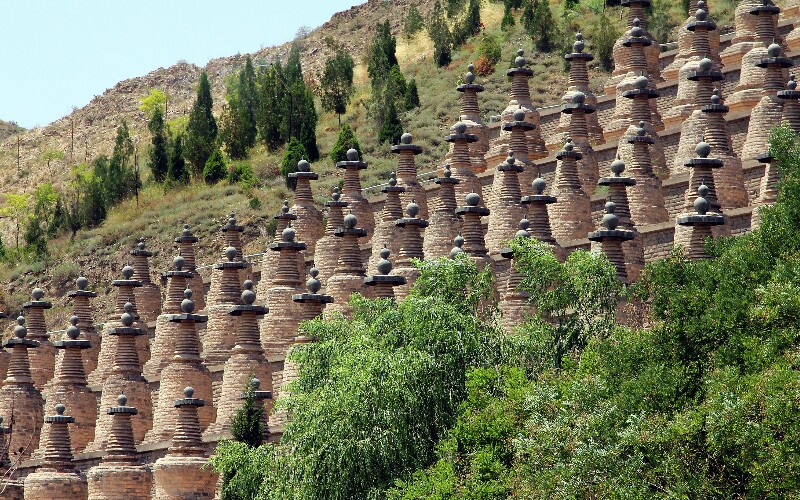The city of Guyuan is located in the southern part of the Ningxia Hui Autonomous Region. It is about 340 kilometers (about 211 miles) away from Yinchuan, the capital city of the region. Car travel from Yinchuan takes about 4 hours, and bus travel takes about 4 to 6 hours, depending on the number of stops. Its eastern, western and southern boundaries border on Gansu province, and its northern part touches Zhongwei and Tongxin, two counties in the area. It has a total area of 16,783 square kilometers that includes one administrated area called Yuanzhou and several counties including: Xiji, Longde, Jingyuan and Pengyang. It has a population of 1.9 million. Hui people are about 49% of the population. It is one of the biggest Hui communities in China.
Guyuan is a historic city. The Great Wall section built by the Qin dynasty passes about 10 kilometers away from the city. Later, Guyuan was a garrison station of Gaoping and Anding counties founded by Emperor Wu of the Han dynasty. It used to be a relatively large city judged by remains such as pottery pipe that was used for sewers in cities during the Han dynasty.
There are two ideas about how the name originated. One version is that the city was once called the "old Yuanzhou". The word old in Chinese is "gu", and so putting gu and Yuan together, people called the city Guyuan. The other idea of its origin is that since the city has a dangerous position that was difficult to travel to, it was named Guyuan. The city was founded about 524 and has had about 1500 years of history. In 1575, the city was enlarged so that there was an inner area surrounded by the city wall, and an outlying area. The city once looked magnificent. During and after the Qing Dynasty (1644-1911 AD) however, the city was destroyed by wars and earthquakes.
The city of Guyuan has beautiful scenery and interesting historical sites. Enjoy the landscape, the Great Wall of the Qin Dynasty, the remains of the ancient city that was built in the Han Dynasty, and the grotto on Xumi Mountain that was built during the Northern Wei era that was a summer residence of Kublai Khan, the Mongolian first emperor of the Yuan dynasty. You'll find the remains of a great civilization. The Liupan Mountain natural reserve that have Laolong Pond, the Liangdian Gorge and the Lotus Garden is the area's natural scenic highlight.
Tips
- Telephone Area code: 0954
- Postal code:756000
Food and Restaurants
Like other cities in Ningxia, Guyuan specializes in Muslim food. Wheat or buckwheat noodles are preferred, and there are some other snacks made from buckwheat, oats and other grains. Liupan mountain is covered with wild vegetation, and it is in the area of Guyuan. So wild herbs and vegetables are collected such as sow thistle and acanthopanax senticosus and used in the cuisine. There are many delicious dishes in Guyuan. The most delicious are fried lamb, Hele (a kind of noodles made from buckwheat), and sow thistle salad. Muslims are not supposed to eat pork or non-kosher meat.
Special Products
The area's special products, "treasures,"are:
- "Blue treasure": Helan stone. It is a kind of blue stone.
- "Yellow treasure": licorice root. It is a commonly used detoxifying medicinal herb.
- "White treasure": Tanyang lamb skin. The fur of a 35 or 40 day old Tanyang lamb is soft and is used for fur coats.
- "Black treasure": star jelly. Is a kind of jelly.
- "Red treasure": medlar. Is a kind of fruit that had medicinal properties. It is said to be good for the eyes, liver and kidney. It also contains anti-cancer and liver nourishing elements. These "treasures" would be good buys. The area also produces oats and benne, and acanthopanax senticosus that is the scientific name for an herb with properties similar to ginseng but is cheaper than ginseng.
Transportation
Air
Guyuan airport is under construction. It lies near Gaopo village of Zhonghe county in the northwestern part of Guyuan city. It is ten kilometers from the center of the city as the crow flies, and thirteen kilometers by road. When the construction is completed, airline routes will be opened from Guyuan to Beijing, Xi'an, Lanzhou, Yinchuan and other cities.
Subway
The railway line from Baotou to Lanzhou goes through Guyuan city, therefore train travel is convenient. Trains from Yinchuan, Xi'an, Lanzhou, Shanghai, Chengdu and Urumqi stop at the Guyuan station. Travel to Xian takes eight hours, Yinchuan takes six hours and Lanzhou takes three and half hours. You can go to the Guyuan station by No.1 bus from the Yuanzhou district.
City Transportation
The flag-down fare for taking a taxi in Guyuan county is only about three yuan.
Highway
The No.319 and No.312 national highways go across Guyuan. At the Guyuan bus station, there are long-distance buses that take you to all the big cities of Ningxia and all the counties of Guyuan. The bus station is on Qinghe Road in the Yuanzhou district, and you can go there by bus No.1, 2, 3, 4, 5, 6 and 16. The highway transportation network is modern, and you can take long-distance buses that go to Yinchuan, Lanzhou and Xi'an every day. The easiest way to get to Guyuan is from Yinchuan. The bus ride is 4 to 6 hours.
Weather
Situated in a warm semiarid climate region of the loess plateau, Guyuan has a long and cold winter, and a short and cool summer. In the spring, the temperature varies a lot. The city covers a large region of hills and mountains, so the weather is different in different regions. In the summer, the days are hot and dry, but the nights are cool.
Because it is in a desert area, the temperature drops a lot at night. July is the hottest month, when the temperature averages about 23 degrees Celsius which equals about 73 degrees F. Its elevation is about 1600 meters (about 5,200 feet). This is about the same elevation as Denver in the US, about a mile, and explains the temperature extremes and also the intense sun radiation. In the winter, the average temperature is about -5 degrees Celsius or about 23 °F. This is quite cold.
There is relatively little rain in the spring and the beginning of summer. There are often storms and the weather is sometimes hazardous. The average number of sunlight hours per year is 2518.2 hours, and the average annual temperature is 6.1 °C. The average annual rainfall is 492.2 mm.
Summer and autumn are the best seasons for you to travel in Guyuan, a part of China's frontier, to enjoy the local customs and the magnificent natural landscape of the northwest region of China. The Liupan Mountain scenery is beautiful in the summer and is becoming a summer resort area in China.










